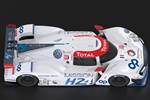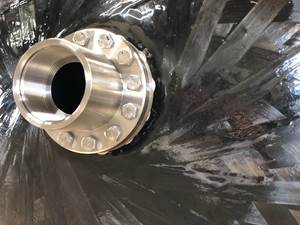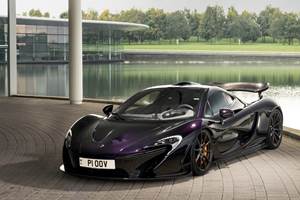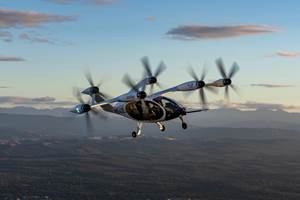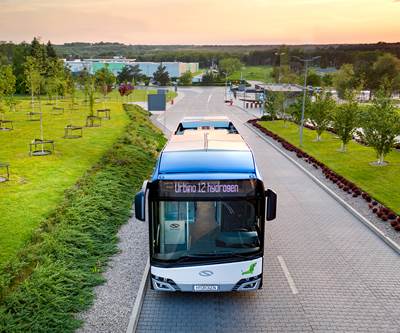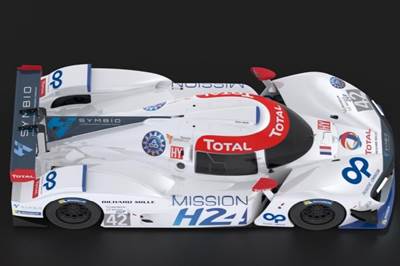Hyundai announces plan to offer XCient Fuel Cell commercial trucks in Europe
The successful delivery began Hyundai’s hydrogen energy push, including the goal to expand the technology to North America and China in the near future.
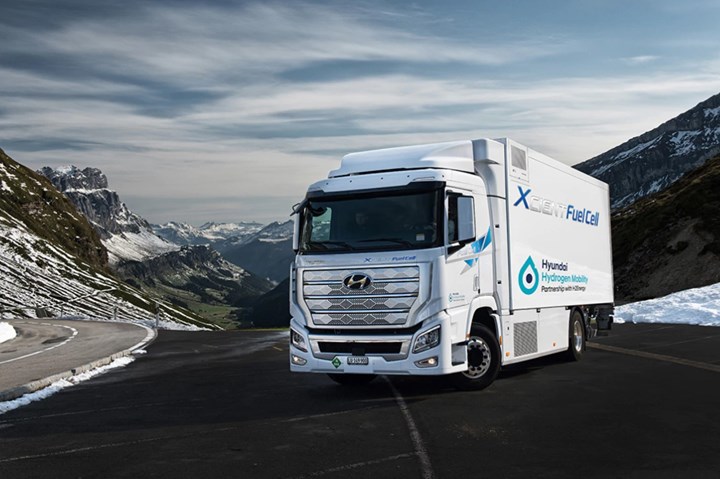
Photo Credit: Hyundai Motor Co.
Hyundai Motor Co. (Seoul, South Korea) announced on Oct. 7 that it has delivered the first seven units of its Xcient Fuel Cell — what the company says is the world’s first mass-produced fuel cell electric heavy-duty truck — to customers in Switzerland, with a total of 50 hitting the roads there this year. The delivery of Xcient Fuel Cell marks the official entry of Hyundai’s commercial vehicles in the European market, a touchstone for the company’s expansion into the North American and Chinese commercial markets.
“The delivery starts a new chapter not only for Hyundai’s hydrogen push, but also the global community’s use of hydrogen as a clean energy source,” says In Cheol Lee, executive vice president and head of Commercial Vehicle Division at Hyundai Motor. “This delivery is just a beginning as it opens endless possibilities for clean mobility. With successful delivery of the first Xcient Fuel Cell trucks, we proudly announce our plan to expand beyond Europe to North America and China where we are already making great progress.”
It is reported that production capacity of the Xcient Fuel Cell will reach 2,000 units per year by 2021 to support its expansion into Europe, the U.S. and China as demand for clean mobility grows. The increase in capacity will be backed by a USD $1.3 billion investment in addition to a previously announced USD $6.4 billion stake in establishing a hydrogen ecosystem to support creation of a hydrogen society.
As part of its production expansion plan, Hyundai expects to supply 1,600 commercial fuel cell trucks by 2025.
In the U.S., Hyundai says it is collaborating with logistics leaders to supply mass-produced fuel cell heavy-duty trucks. Hyundai revealed the fuel cell-powered HDC-6 Neptune Concept Class 8 heavy-duty truck at the North American Commercial Vehicle (NACV) Show in October 2019, hinting at what the future holds and Hyundai’s plans for it. To back this plan, Hyundai is partnering with companies to build a complete hydrogen value chain covering everything from hydrogen production and charging stations to service and maintenance. The North American market will also get a six-by-four tractor model. By 2030, Hyundai expects more than 12,000 fuel cell trucks to hit the U.S. roads.
Hyundai notes it is also working with various parties in China, which aims to get one million hydrogen vehicles on its roads by 2030, especially as the country’s hydrogen industry is on a sharp growth trend. Initially, Hyundai will focus on China’s four major hydrogen hubs: Jin-jin-ji, Yangtze River Delta, Guangdong Province and Sichuan Province. It is currently discussing cooperative initiatives such as a joint venture with local partners.
Three fuel cell electric trucks are scheduled for launch in China: a medium-duty truck in 2022, a heavy-duty truck in in a couple of years, and another heavy-duty truck strategically designed for the China market. With these models, Hyundai’s goal is to achieve aggregate sales volume of 27,000 units by 2030.
A key to Hyundai’s global expansion of fuel cell trucks will be the successful launch of Xcient Fuel Cell in Europe. The seven customers who received the first batch of Xcient Fuel Cell trucks will haul payloads of consumer goods around Switzerland, emitting nothing but clean water vapor. The operations will be backed by a robust green hydrogen ecosystem.
In 2019, Hyundai Motor Co. formed Hyundai Hydrogen Mobility (HHM), a joint venture with Swiss company H2 Energy. HHM also is partnering with Hydrospider, a joint venture of H2 Energy, Alpiq and Linde. It is said customers will be leasing Xcient Fuel Cell trucks from HHM on a pay-per-use basis that does not require an initial investment. Hyundai plans to take the success in Switzerland to broader European markets as Hyundai establishes solutions and partner networks in Austria, Germany, the Netherlands and Norway.
As part of its production expansion plan, Hyundai expects to supply 1,600 commercial fuel cell trucks by 2025. Currently, Coop, Migros, Traveco, Galliker Logistics, Camion Transport, F. Murpf AG and G. Leclerc Transport AG, along with others, have placed orders for Xcient Fuel Cell. The trucks will be used to haul everything from food to cars around Europe.
Further, to support the growing hydrogen ecosystem, Hyundai has a business case for more than 100 hydrogen fueling stations in Switzerland, which is enough not only for commercial vehicles, but also passenger fuel cell electric vehicles. Likewise, Hyundai plans to act as a sector coupler in bringing various players to the hydrogen value chain as part of its efforts to bring value.
Hyundai will introduce a full model change for Xcient Fuel Cell that will sit on a dedicated hydrogen fuel cell truck platform in the next few years. The new model will feature an e-axle and two 200-kilowatt (kW) fuel cell systems that are under development. The new model lineup will include four by two and six by two cargo trucks, and four by two tractors that can cover a significant portion of Europe’s major heavy duty truck market. The 44-ton GCW tractor will have a range of up to 1,000 kilometers on a single charge. These models will reportedly help the effort to replace pollutant-emitting diesel-powered trucks.
Hyundai has been devoting itself to further develop fuel cell technology and establish the supply chain to realize a ‘Hydrogen Economy’ for a better and cleaner future, an effort receiving worldwide acclaim. Hyundai Motor’s Hydrogen Mobility Solution won the Truck Innovation Award at the International Truck of the Year (IToY) last year, and Xcient FC won the Innovation Award in hydrogen energy and fuel cell technology at the 5th Shanghai Forum held on September this year.
Find the XCIENT Fuel Cell’s main specifications here.
The Fuel Cell Hydrogen Observatory (FCHO) recently provided technology and market statistics and other data on the hydrogen sector.
Related Content
Infinite Composites: Type V tanks for space, hydrogen, automotive and more
After a decade of proving its linerless, weight-saving composite tanks with NASA and more than 30 aerospace companies, this CryoSphere pioneer is scaling for growth in commercial space and sustainable transportation on Earth.
Read MoreMcLaren celebrates 10 years of the McLaren P1 hybrid hypercar
Lightweight carbon fiber construction, Formula 1-inspired aerodynamics and high-performance hybrid powertrain technologies hallmark this hybrid vehicle, serve as a springboard for new race cars.
Read More“Structured air” TPS safeguards composite structures
Powered by an 85% air/15% pure polyimide aerogel, Blueshift’s novel material system protects structures during transient thermal events from -200°C to beyond 2400°C for rockets, battery boxes and more.
Read MorePlant tour: Joby Aviation, Marina, Calif., U.S.
As the advanced air mobility market begins to take shape, market leader Joby Aviation works to industrialize composites manufacturing for its first-generation, composites-intensive, all-electric air taxi.
Read MoreRead Next
Hexagon awarded fuel systems order for hydrogen buses
The Solaris Urbino 12 hydrogen buses will reportedly have a driving range of up to 350 kilometers on one fill, with weight savings of 20% compared to previous models.
Read MorePlastic Omnium supplies composite hydrogen storage tanks for MissionH24 cars
Plastic Omnium’s Type IV overwrapped carbon fiber tanks will be subjected to highly demanding operating conditions in terms of speed, refueling frequency and temperature.
Read MoreAll-recycled, needle-punched nonwoven CFRP slashes carbon footprint of Formula 2 seat
Dallara and Tenowo collaborate to produce a race-ready Formula 2 seat using recycled carbon fiber, reducing CO2 emissions by 97.5% compared to virgin materials.
Read More


